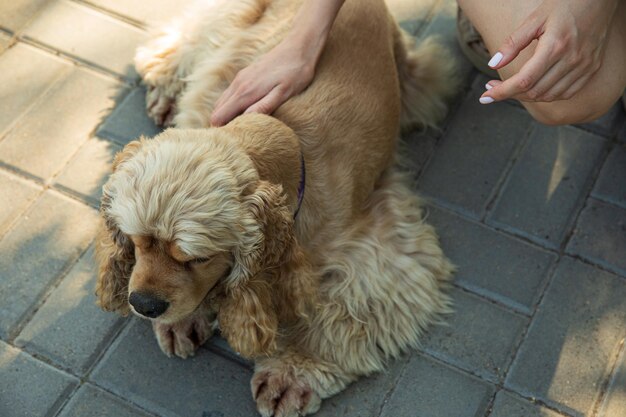Your Guide to What Causes Incontinence In Dogs
What You Get:
Free Guide
Free, helpful information about Incontinence FAQ and related What Causes Incontinence In Dogs topics.
Helpful Information
Get clear and easy-to-understand details about What Causes Incontinence In Dogs topics and resources.
Personalized Offers
Answer a few optional questions to receive offers or information related to Incontinence FAQ. The survey is optional and not required to access your free guide.
Understanding Dog Incontinence: Causes and Solutions
Few things are as worrying for a pet owner as discovering that their once house-trained dog has begun to have accidents inside the home. Incontinence in dogs isn’t just a minor inconvenience; it can be a sign of underlying health issues that need to be addressed promptly. Understanding what causes this problem can help you provide the best care for your furry family member.
Common Causes of Incontinence in Dogs
Age-related Changes: As dogs age, they can experience weakening of the muscles that control bladder function. This is especially common in older dogs who may suffer from disorders like canine cognitive dysfunction, akin to Alzheimer’s in humans, which can impact their ability to hold urine.
Urinary Tract Infections (UTIs): Similar to humans, dogs can experience urinary tract infections that cause irritation and frequent urination, sometimes leading to accidents. If you notice your dog straining or whining while urinating, a UTI might be the culprit.
Hormonal Imbalances: Typically seen in spayed females, a condition known as hormone-responsive urinary incontinence can cause involuntary leaking due to a lack of estrogen affecting the urethral sphincter’s ability to close properly.
Obesity: Excess weight can place additional pressure on the bladder, leading to unexpected leaks. Maintaining a healthy weight through a balanced diet and regular exercise can alleviate this pressure.
Neurological Disorders: Diseases affecting the nervous system, such as spinal injuries or degenerative diseases, can impact your dog’s ability to control their bladder. This may require intervention through medication or surgery, depending on the severity.
Congenital Defects: Some dogs are born with defects in their urinary system, such as ectopic ureters, which can lead to lifelong incontinence unless corrected surgically.
Solutions and Support
Addressing incontinence involves more than just managing symptoms; it’s about contributing to your dog’s overall quality of life. A vet can perform the necessary diagnostics, such as blood tests, urinalysis, or imaging, to determine the cause and provide a targeted treatment plan.
Practical Tips
- Regular Vet Check-ups: Keep up with regular veterinary visits to catch any early signs of health issues and manage conditions before they escalate.
- Diet and Exercise: Ensuring your dog remains at a healthy weight can help with overall control and mobility.
- Diapers and Mats: In cases where control cannot be regained, doggy diapers and absorbent mats can help protect your home and furniture.
Going Beyond the Basics: Financial and Educational Support
Dealing with pet incontinence can introduce unanticipated costs for medical tests, treatments, and possibly surgery. Exploring financial assistance options can help alleviate any stress related to these expenses.
- Pet Insurance: Consider enrolling your dog in a pet insurance program that covers diagnostic testing and treatments for conditions like incontinence.
- Veterinary Assistance Programs: Nonprofits and charities often provide grants or low-cost services to pet owners facing financial hardship.
- Educational Resources: Online courses and local classes offer valuable information on managing canine health conditions and can empower you with the knowledge to provide better care.
Financial Support and Educational Opportunities
- 🐾 Pet Insurance Plans: Coverage for veterinary bills specific to your dog’s condition.
- 📊 Medical Aid Funds: Charities offering support for pet healthcare costs.
- 📚 Educational Workshops: Courses aimed at understanding pet health.
- 🏥 Veterinary Low-cost Clinics: Affordable vet services in your area.
- 🎓 Online Pet Care Courses: Enriching your knowledge about pet wellness.
Facing such challenges with your pet can be daunting, but with the right information and resources, you can ensure your companion continues to lead a happy, comfortable life.
What You Get:
Free Incontinence FAQ Guide
Free, helpful information about What Causes Incontinence In Dogs and related resources.

Helpful Information
Get clear, easy-to-understand details about What Causes Incontinence In Dogs topics.

Optional Personalized Offers
Answer a few optional questions to see offers or information related to Incontinence FAQ. Participation is not required to get your free guide.


Discover More
- a Patient You Are Caring For Uses Incontinence Briefs
- Are Incontinence Products Tax Deductible
- Are Incontinence Supplies Covered By Medicare
- Are Incontinence Supplies Tax Deductible
- Can a Bladder Infection Cause Urinary Incontinence
- Can a Kidney Stone Cause Incontinence
- Can a Urinary Tract Infection Cause Incontinence
- Can a Uti Cause Incontinence
- Can Constipation Cause Incontinence
- Can Constipation Cause Urinary Incontinence
